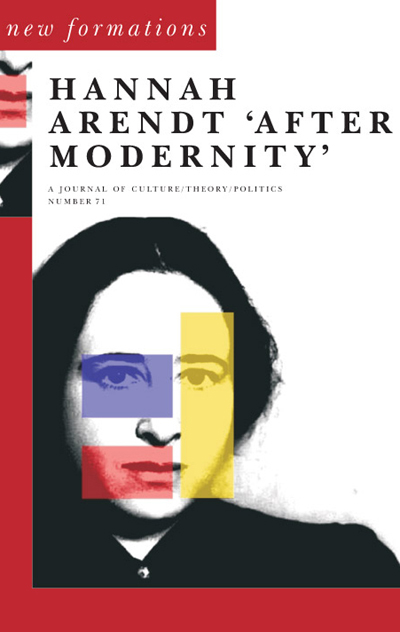
Hannah Arendt and the concept of revolution in the 1960s
New Formations - Print ISSN 0950-2378 - Online ISSN 1741-0789
Volume 2010 Number 71
Hannah Arendt and the concept of revolution in the 1960s
Richard H. King
Abstract
Neglected until recently, Hannah Arendt’s exploration of the relationship between European imperialism and the rise of fascism, especially Nazism, offers fresh ways to study the rise of modern totalitarian regimes. Indeed, Paul Gilroy, among others, has underscored Arendt’s importance for understanding contemporary race-thinking around the globe, while African Studies specialists still see Arendt’s Origins of Totalitarianism as one of the founding texts of their discipline. That said, David Scott, in his Conscripts of Modernity (2004), has criticised Arendt for failing to group the Haitian Revolution with the American and French Revolutions as landmarks in the emergence of political modernity. Once more, Scott suggests, the non-European world is slighted.
In my essay I want to explore the issues raised above and then propose that if we look at C.L.R. James’s The Black Jacobins (1938; 1963), Frantz Fanon’s The Wretched of the Earth (1961) and Arendt’s On Revolution (1963), we have three models of revolution. James emphasises the social and economic dimension; Fanon the psychological; and Arendt the political. From this perspective, Arendt was tone-deaf to the Haitian Revolution because she was pre-disposed to fear revolutions whose main goal was the alleviation of poverty and clearly disliked Fanon’s emphasis upon the reconstruction of self aimed for through revolutionary violence. In truth, Fanon’s emphasis upon recognition signalled another goal of Third World revolution beyond national liberation - the forging of a new individual and group identity through revolutionary struggle. Finally, I will suggest that in the post-colonial era, Arendt’s focus on the importance of a ‘constitution of liberty,’ implying for her a politics of democratic participation in the context of stable institutions, remains a worthy, if more limited, goal of post-colonial regimes.
SORRY - you are not registered as being permitted online access to the full text of this article
You have the following options:
- If you are viewing this via an institution or academic library you can ask that your institution takes out a Subscription to this journal.
- If you already have a Personal Subscription please login below
Forgotten your username / password? Click here to locate
- Purchase an annual Personal Subscription
PRINT + DIGITAL personal subscription (£45 / year)
DIGITAL personal subscription (£30 / year)
A Personal Subscription provides immediate access not only to the single article you are seeking, but also to all past and future articles in this journal up to the expiry of your annual (calendar year) subscription. - Purchase immediate access to this single article (UK£7.00) - Buy article Coming Soon
To cite this article
Richard H. King (2010) Hannah Arendt and the concept of revolution in the 1960s, New Formations, 2010(71)
